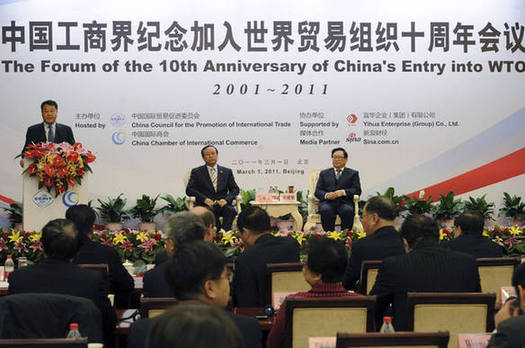| Further Reform and Opening-up – A Must for Integration into the World Economy
An Interview with Xue Rongjiu, Vice-Chairman of the China Society for World Trade Organization Studies
By staff reporter LU RUCAI
THE year 2011 marks the 10th anniversary of China's accession to the World Trade Organization (WTO). Benefiting from the rules of the WTO, China's foreign trade and economic strength have fueled its rapid development during the past decade. The rules propelled China to not only undertake further reform and opening-up, but also improve its market economy system. China Today (CT) were granted an exclusive interview with Xue Rongjiu, vice-chairman of the China Society for World Trade Organization Studies. As a supervisor of PhD candidates at the University of International Business and Economics, Professor Xue has long been engaged in studying the General Agreement on Tariffs and Trade (GATT) and the WTO itself.
 |
| The Forum of the 10th Anniversary of China's Entry into the WTO opens on March 1, 2011. |
CT: During the past 10 years, how has China met its obligation to fulfill its commitment to the WTO? What benefits has the WTO brought to China?
Xue: It should be mentioned that China did well in fulfilling its commitment to the WTO, judging from the praise and affirmation we've received from WTO officials and members. The WTO Director-General Pascal Lamy assessed China's performance as "A+", which amounts to full recognition of the country's efforts.
Specifically, China has achieved all tariff-reductions promised, reducing the general tariff level from 15.3 percent in 2002 to 9.8 percent in 2010, while the average tariff on industrial goods fell from 14.7 percent to 8.9 percent. China canceled all non-tariff measures on imported products under 424 tax file numbers. Of the 160-odd service trade departments listed by the WTO, China has opened up more than 100, or 62.5 percent. The degree of opening in some sectors is close to that in developed countries. China's non-financial overseas direct investment has also increased from US $1 billion in 2002 to US $59 billion in 2010, involving 170 countries and regions in the world. Some 480 of the world's top 500 companies are now doing business in China.
Moreover, China's comprehensive strength has developed vigorously. Over the last 10 years, China's GDP has been growing by an average of 10.5 percent annually. In 2010, China became the world's second largest economy. We can say that China's accession to the WTO brings prodigious benefits to its enterprises and people.
| 